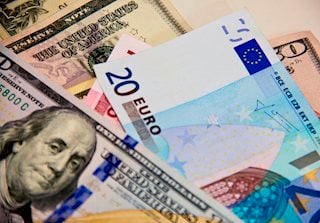EUR/USD appreciates to near 1.0850 ahead of US PCE inflation
|
- EUR/USD extends gains as the Greenback weakens ahead of the US PCE Price Index.
- The US Dollar may limit its downside as stronger US economic data have reduced rate cut expectations for September.
- The Euro may face challenges as the near-term ECB’s policy outlook remains uncertain.
EUR/USD trades around 1.0860 during the Asian session on Friday, extending its gains after rebounding from a two-week low of 1.0825 recorded on Wednesday. This upside of the EUR/USD pair is attributed to the weakening of the US Dollar (USD) ahead of the release of the US Personal Consumption Expenditures (PCE) Price Index for June.
However, the US Dollar may limit its downside as stronger US economic data have reduced some rate cut expectations for September. On Thursday, the US Gross Domestic Product (GDP) for the second quarter (Q2) was stronger than expected. This follows Wednesday’s US PMI data, which indicated a faster expansion in private-sector activity for July, highlighting the resilience of US growth despite elevated interest rates.
The US GDP grew at an annualized rate of 2.8%, adjusted for seasonality and inflation, up from the previous reading of 1.4% and surpassing forecasts of 2%. Additionally, the Composite PMI rose to 55.0 from the previous 54.8 reading, marking the highest reading since April 2022 and indicating sustained growth over the past 18 months.
According to CME Group’s FedWatch Tool, markets now indicate an 88.6% probability of a 25-basis point rate cut at the September Fed meeting, down from 94.0% a week earlier.
The Euro has encountered difficulties as the near-term European Central Bank’s (ECB) outlook remains uncertain due to strong expectations of additional rate cuts. The ECB is anticipated to lower interest rates two more times this year, as price pressures are expected to persist at current levels throughout the year and only return to the bank’s target in 2025.
Meanwhile, a significant decline in Eurozone business activity, particularly in Germany, has heightened expectations for further interest rate cuts to stimulate economic growth. The German flash Composite Purchasing Managers Index (PMI) unexpectedly contracted in July. Euro traders will need to await next week’s pan-EU Gross Domestic Product (GDP) update for further insights.
Euro FAQs
The Euro is the currency for the 20 European Union countries that belong to the Eurozone. It is the second most heavily traded currency in the world behind the US Dollar. In 2022, it accounted for 31% of all foreign exchange transactions, with an average daily turnover of over $2.2 trillion a day. EUR/USD is the most heavily traded currency pair in the world, accounting for an estimated 30% off all transactions, followed by EUR/JPY (4%), EUR/GBP (3%) and EUR/AUD (2%).
The European Central Bank (ECB) in Frankfurt, Germany, is the reserve bank for the Eurozone. The ECB sets interest rates and manages monetary policy. The ECB’s primary mandate is to maintain price stability, which means either controlling inflation or stimulating growth. Its primary tool is the raising or lowering of interest rates. Relatively high interest rates – or the expectation of higher rates – will usually benefit the Euro and vice versa. The ECB Governing Council makes monetary policy decisions at meetings held eight times a year. Decisions are made by heads of the Eurozone national banks and six permanent members, including the President of the ECB, Christine Lagarde.
Eurozone inflation data, measured by the Harmonized Index of Consumer Prices (HICP), is an important econometric for the Euro. If inflation rises more than expected, especially if above the ECB’s 2% target, it obliges the ECB to raise interest rates to bring it back under control. Relatively high interest rates compared to its counterparts will usually benefit the Euro, as it makes the region more attractive as a place for global investors to park their money.
Data releases gauge the health of the economy and can impact on the Euro. Indicators such as GDP, Manufacturing and Services PMIs, employment, and consumer sentiment surveys can all influence the direction of the single currency. A strong economy is good for the Euro. Not only does it attract more foreign investment but it may encourage the ECB to put up interest rates, which will directly strengthen the Euro. Otherwise, if economic data is weak, the Euro is likely to fall. Economic data for the four largest economies in the euro area (Germany, France, Italy and Spain) are especially significant, as they account for 75% of the Eurozone’s economy.
Another significant data release for the Euro is the Trade Balance. This indicator measures the difference between what a country earns from its exports and what it spends on imports over a given period. If a country produces highly sought after exports then its currency will gain in value purely from the extra demand created from foreign buyers seeking to purchase these goods. Therefore, a positive net Trade Balance strengthens a currency and vice versa for a negative balance.
Information on these pages contains forward-looking statements that involve risks and uncertainties. Markets and instruments profiled on this page are for informational purposes only and should not in any way come across as a recommendation to buy or sell in these assets. You should do your own thorough research before making any investment decisions. FXStreet does not in any way guarantee that this information is free from mistakes, errors, or material misstatements. It also does not guarantee that this information is of a timely nature. Investing in Open Markets involves a great deal of risk, including the loss of all or a portion of your investment, as well as emotional distress. All risks, losses and costs associated with investing, including total loss of principal, are your responsibility. The views and opinions expressed in this article are those of the authors and do not necessarily reflect the official policy or position of FXStreet nor its advertisers.